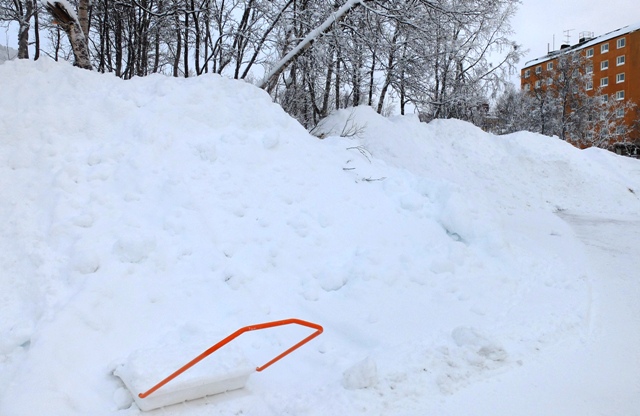Snow ploughs were out in the centre of town this weekend. There’d been very little recent snowfall but there they were, moving every bit of snow from pavements, parking areas, streets. Meanwhile, in our own street, we and a few other neighbours were also active, moving snow.
It might have looked as if we had nothing else to do. As if we missed having snow to shovel so even when there was none falling we couldn’t stop ourselves from moving it from A to B, just for the hell of it.
We were moving heavy blocks of snow from deep in our garden out to the public snow pile. Dragging snow icebergs up the driveway was hard labour, and our reasons for doing this were not easy to see.
Looking down our steep narrow driveway we’d created several roofless tunnels far out to the side, each with a sloping end, like a ski jump. Elsewhere tunnels opened up into open areas, like hidden caverns.
We’d all read the forecast: continuous snow for the whole week. Driveways and parking areas fill up fast with non-stop snow and minus degree temperatures. Where were we going to put it all? We were already full to the brim around the house, snow pushed right to the limits of the space. But now we had places to push it, pile it, store it – the week ahead felt much more manageable.
As the snow falls now we’re grateful for all those spaces. We’ll be doing shifts outside every day, moving and piling up the snow around the house.
It’s meditative, moving snow. At least, that’s what I generally focus on, rather than feel exhausted, or cold, or bored. It’s repetitive, literally. You move the snow – it reappears – you move it again. You get to think.
It feels creative too, the shape of your snow piles, the tracks in the snow. As you make another tunnel you think about escape routes more generally. The snow forces you to think ahead, and it might be good to do that in life too. Not wait until you get squeezed in a corner but prepare a short escape route to store yourself, your problems, your thoughts, just in case you need it.
How you manage the snow triggers your wider thinking. The annoyance of snow falling off the shovel as you push, the snow that is lost, that you have to go back for – these are all familiar experiences in other forms in daily life.
You need patience and persistence for the up and down distances you have to cover to collect the snow, and ingenuity to amuse yourself while you do this (how straight is my line of travel? how arty is the curve of snow left behind?).
You learn to appreciate cooperation between people (one person makes a low pile and the other pushes up on top of it) and you’re grateful for the work that was done before you.
You find out that, as in life, the most useful and necessary thing to do is probably not the most obvious; you need to create space before you can fill it up.


